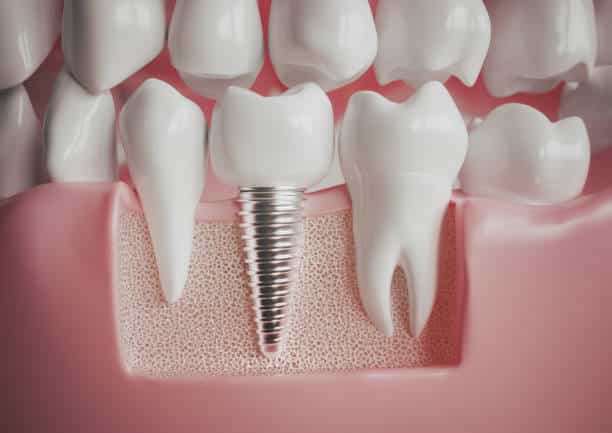Beautiful & Permanent Tooth Replacement
To help patients with missing teeth, Dr. Bhalla at Independence Dental is ready to offer the most complete solution available today: dental implants. Unlike other tooth replacements, they actually restore the complete tooth above and below the gum line, delivering the most natural-looking, reliable, and long-lasting results possible. Dr. Bhalla is specially trained to provide all aspects of the implant procedure, so if you’re ready to finally say “goodbye!” to the gaps in your smile, she’ll be able to guide you through the entire journey.

Indications for Dental Implants
One of the biggest advantages of dental implants is that they can be used to replace any number of missing teeth:
Missing One Tooth
After a prosthetic root has been placed into the jawbone, Dr. Bhalla can attach an all-porcelain crown to it using a connector called an abutment. This crown will be color-matched to a person’s enamel so that it seamlessly blends into the smile. Once in place, a patient will be able to maintain the crown just like a regular tooth with consistent brushing and flossing. This is all it takes to help it look and feel great for decades to come.
Missing Multiple Teeth
Dental implants can also be used to support a bridge to replace multiple missing teeth in a row. Two dental implant crowns are positioned on either side of the missing ones, and these are attached to prosthetic teeth to close the gap. Compared to a traditional bridge, an implant bridge has a much more secure hold, looks more natural, and can be trusted to last longer as well. Plus, it doesn’t require healthy teeth to be shaved down to hold the supporting crowns as well, helping preserve more of a patient’s natural smile.
Missing All of Your Teeth
Implant-retained dentures are an excellent and cost-effective option for patients missing a large number of teeth. Rather than replacing each one with a single implant, a few strategically located implants can be used to support an entire denture. Because these dentures are anchored directly to the jawbone, they have a fit and stability a traditional prosthetic simply can’t match. They have also been shown to restore much more of a patient’s bite strength, enabling them to enjoy a much more varied and healthy diet.
How Do Dental Implants Work?
The first step on your journey to a new smile is a consultation with Dr. Bhalla, wherein she will determine whether implants are right for you. If they are, you’ll undergo a minimally invasive surgery so the implants can be placed within your jawbone. After the implants have bonded with your body, you’ll receive abutments and your final restorations. The entire process may take anywhere from several months to a year, but the reward of a strong and beautiful smile is well worth the wait!
Benefits of Dental Implants
Some of the most outstanding benefits of dental implants in Plano include:
- Bone preservation: After you lose a tooth, the bone that once supported it begins to deteriorate. Because implants act like tooth roots, they stimulate the jaw and help to keep it whole and strong.
- A high success rate: Dental implants are successful in over 95 percent of cases.
- Easy maintenance: Caring for dental implants is neither complex nor time-consuming. As long as you maintain excellent hygiene habits and visit your dentist in Plano TX for periodic checkups, it’s unlikely that you’ll encounter any problems with your new smile.
- Protection for remaining teeth: Dental implants help to prevent your remaining natural teeth from drifting out of place, thereby allowing you to maintain a comfortable and well-aligned bite.
- Remarkable aesthetics: Dr. Bhalla takes great care to design teeth that complement your natural smile. The materials used to create the prosthetic teeth (either acrylic or porcelain) even reflect light in a manner that is similar to real tooth enamel.
Why Choose Independence Dental?
Most dentists have to refer patients to an outside specialist for part of the dental implant process, which can be inconvenient and even nerve-racking. At Independence Dental, however, Dr. Simran Bhalla is qualified to perform every phase of treatment, including the complex and delicate implant placement surgery. As a member of the International Congress of Oral Implantologists (ICOI), she regularly dedicates time to keeping up with the latest advances in implant dentistry. Your smile is in truly expert hands at Independence Dental! Request an appointment today!
